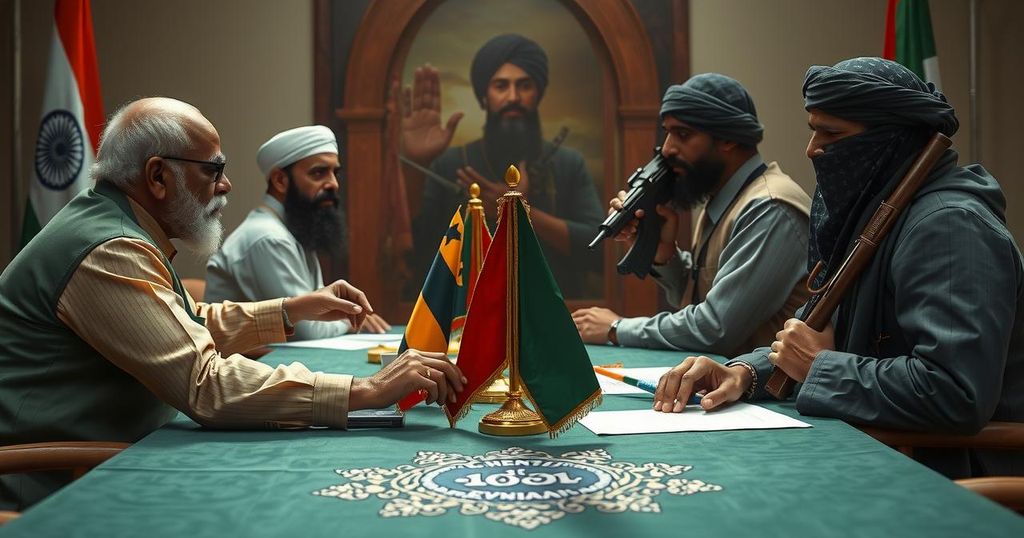India’s Strategic Engagement with the Taliban: A New Diplomatic Approach
India’s recent diplomatic overture towards the Taliban signifies a strategic shift aimed at reclaiming its influence in Afghanistan post-Kabul’s fall. The meeting between India’s diplomat and the Taliban leadership highlights a renewed interest in enhancing trade and connectivity while navigating complex geopolitical tensions, particularly concerning Pakistan’s role. Despite potential risks, India’s engagement reflects a pragmatic approach to secure its long-standing interests and historical ties with Afghanistan.
India’s recent approach towards the Taliban government in Afghanistan signifies a fundamental shift in its foreign policy regarding the region. Following the Taliban’s seizure of power in 2021, India experienced a significant strategic loss, reversing its long-term investments in Afghanistan’s democratic structure, including developmental aid and military support. Over the past week, India’s Deputy Ambassador Vikram Misri’s meeting with the Taliban’s acting foreign minister in Dubai marked a new chapter in India-Taliban relations, where the Taliban expressed intentions to strengthen political and economic ties with India, acknowledging its role as a significant power in the region.
This diplomatic engagement is noteworthy, since it offers the Taliban a form of recognition from a nation that previously maintained its distance. Experts highlight that India’s outreach constitutes both a diplomatic achievement for the Taliban and a strategic recalibration for India to protect its interests in the face of rising influence from regional adversaries like Pakistan and China. India aims to enhance trade routes, particularly through Iran’s Chabahar port, positioning itself more favorably within Central Asia.
India’s perspective is complicated by its historical ties to Afghanistan, as articulated by Foreign Minister S. Jaishankar and supported by various developmental projects that India has undertaken in Afghanistan amounting to $3 billion. Although no country has officially recognized the Taliban regime, the international community remains engaged in varying capacities. Observers like Jayant Prasad suggest India’s strategy is essential for maintaining influence, given the precarious nature of regional diplomacy and existing security concerns surrounding terrorism.
As India cautiously fosters ties with the Taliban, motives extend beyond mere relations; they also aim to counter-balance Pakistan’s strategic positioning, particularly amid increasing tensions between the two nations. Cooperation over Afghanistan could enhance India’s connectivity aspirations, particularly through initiatives linking with Central Asia via Iran. However, potential risks loom in India’s burgeoning relationship with the Taliban, a group still aligned with extremist factions and whose reliability remains questionable.
While experts caution against the dangers of aligning with the Taliban, some assert that maintaining dialogue may yield positive pressures for internal reforms, particularly concerning human rights issues. The nuanced nature of India’s diplomatic engagement with the Taliban is indicative of both pragmatic considerations and the broader geopolitical landscape, reflecting an ongoing evolution in the dynamics of South Asian politics.
The Taliban’s resurgence in Afghanistan following its takeover in August 2021 posed formidable challenges to India, which had invested significantly in Afghanistan’s democratic development over the previous two decades. Following Kabul’s fall, India found itself with reduced influence and increased security concerns due to heightened activity from its regional competitors, particularly Pakistan and China. The Taliban’s return to power pivoted the geo-political landscape, compelling India to reassess its diplomatic engagements and adopt a more pragmatic stance while grappling with the complexities of international relations surrounding Afghanistan.
In conclusion, India’s outreach to the Taliban marks a significant strategic shift aimed at safeguarding its interests in Afghanistan amidst a changing geopolitical landscape. While India seeks to enhance diplomatic relations and economic ties, it must navigate the complexities associated with collaborating with an entity recognized for its violent past. Ultimately, through engagement, India aims to leverage its historical ties with Afghanistan to counter regional adversaries, foster stability, and ensure its strategic relevance in the region.
Original Source: www.bbc.com








Post Comment